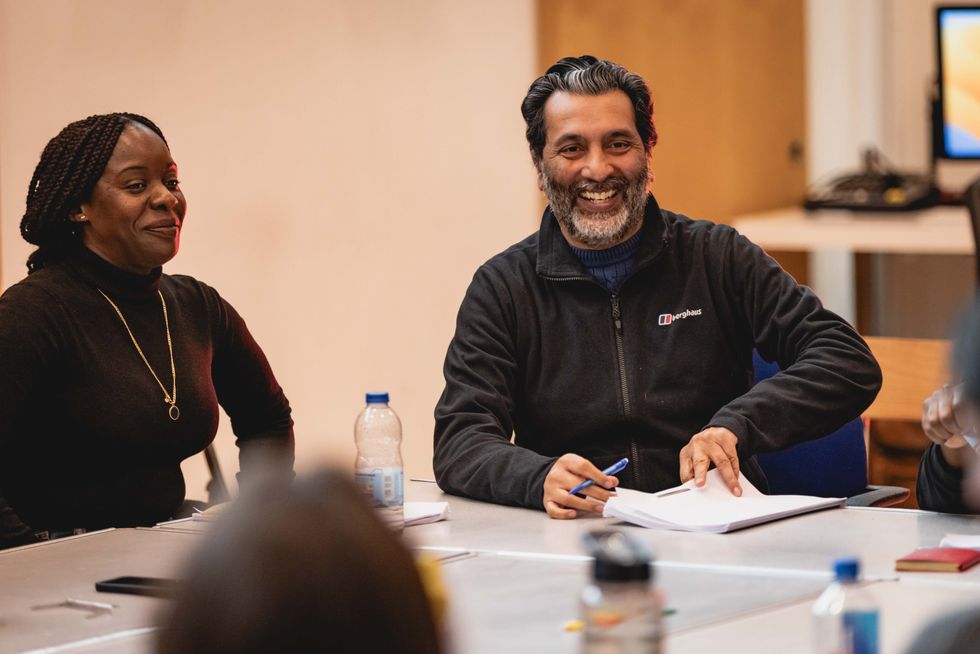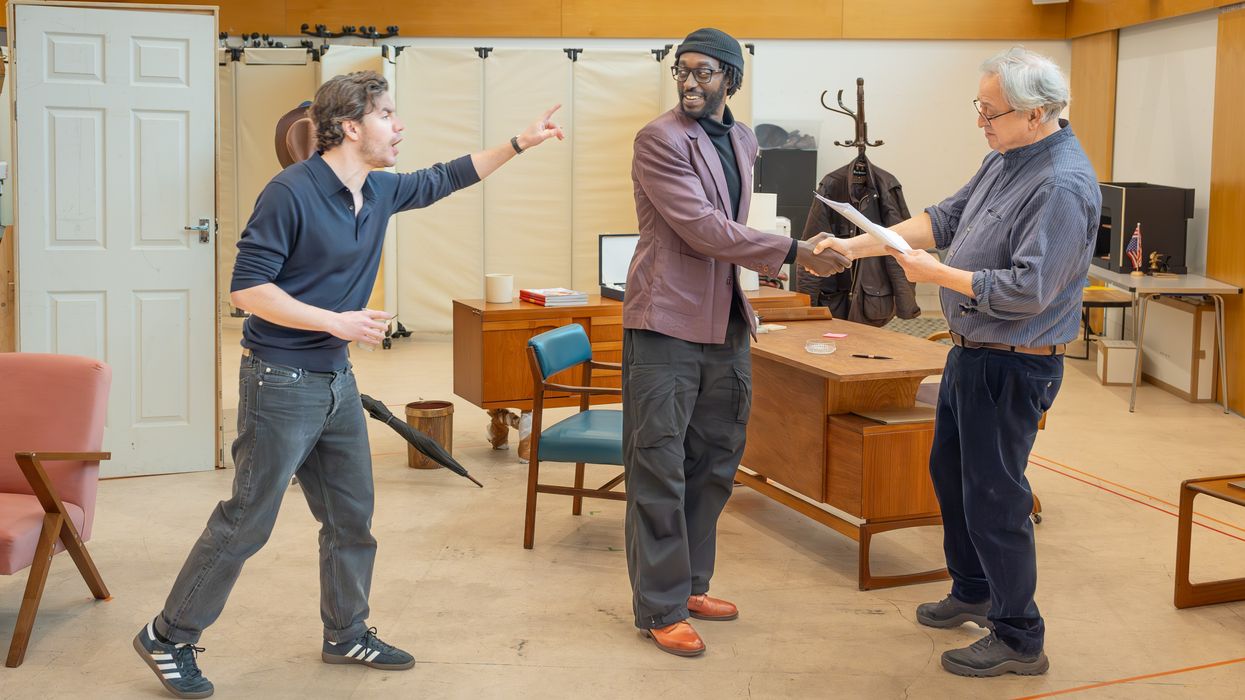RETROGRADE, a play centred around Sidney Poitier, deals with themes of inequality and discrimination and will appeal to the younger generation in the UK, its Asian director has said.
Amit Sharma is the artistic director of the Kiln in north London, where Retrograde was first performed.
Poitier, perhaps best known for his roles in Porgy and Bess, Guess Who’s Coming to Dinner, In The Heat of The Night and To Sir, With Love, was the first African American actor to win an Oscar for best actor for Lilies of the Field (1963).
Written by Ryan Calais Cameron, Retrograde tells a story about Poitier’s moral dilemma when signing a contract with a crucial caveat.
“Someone like Poitier, a man of integrity, was given this kind of dilemma, and (the play) reflects how we all are faced with dilemmas every day,” Sharma told Eastern Eye.
“We want the world and people to have equality when it comes to opportunity, but that’s simply not the case. There are people who give opportunities to others, and it’s whether the offer they give is sincere or has power over somebody else,” he added.
Sharma said, “I’m sure all of you have been in a position where someone has offered you an ultimatum or a dilemma, and you’ve either taken it or you haven’t. But in Sidney’s case, he was living in a world where the civil rights movement in America was ongoing and there was not equality for black people.

“Now, that has changed in terms of law and legislation, but discrimination still remains. So this is a play that really reflects on how far we have come, but also how far we have to go.”
Retrograde transferred to the Apollo Theatre in the West End earlier this month and features Olivier and Tony nominated actor Colman Domingo as a producer.
Describing the impact of Poitier, the director said, “He was a truly remarkable man, not only because he was something of a pioneer in his work. Many of his films were about breaking through barriers in the representation of black people on screen. He was really trying to challenge racial injustices in film and television, where in the past, stereotypes and tropes of black people were commonplace.
“He wanted a much more positive and realistic representation of black people on screen.
“He was also an activist away from his professional work. So not only did he make an impact on screen, but he did important work in his personal life as well.”
When it was first staged in April 2023, Retrograde was well received by critics, with praise for both the writer and its lead actor, Ivanno Jeremiah.
Sharma said, “With this play, I’m a British Indian director. The writer is black British. The lead actor (Ivanno Jeremiah) is black British. That’s not to say it hasn’t happened in the past, but right now, we’re the only combination that is delivering a piece of work in the West End.”
He added, “So, of course, many strides have been made, but that example I’ve just given you highlights where we’ve got to go. Because when it comes to people who historically have not had those opportunities, there is a pressure – it’s a good pressure, but there’s a pressure for us to make a success of it, otherwise there’ll be no other opportunity, whereas our counterparts don’t have the same pressures in the same way.”
Born in Delhi, Sharma came to England when he was eight months old with his parents and elder brother. He grew up in Southall, west London.

“We’re Hindus, and my birth chart said my career would be a life in the arts, so my parents pushed me in that direction. I had the support of my family and the support of school.
“I wanted to be an actor and was one for quite a long time. I came across a company called Graeae Theatre Company which was a disabled-led theatre company that offered an opportunity to train with them as an actor, because many drama schools weren’t accessible to disabled people in terms of their training. I went to Graeae and trained with them, and then I started to work as an actor.”
Sharma’s experience included work with companies such as Tamasha and the Unicorn Theatre.
“From a very early age, being in a rehearsal room, I was always very interested in how a director worked. I tried to find opportunities to work as an assistant director, which I was given with companies like Immediate Theatre and Graeae.”
Sharma later joined the Royal Exchange in Manchester, describing it as an “eye-opening experience” that taught him how artistic directors operate within established venues.
He subsequently became deputy artistic director at Birmingham Rep and later accepted Indhu Rubasingham’s invitation to become an associate at the Kiln Theatre, where he has been for the past year.
He said there’s been massive movement in the right direction when it comes to representation in arts.
“Fundamentally, it comes to equality of opportunity, and historically, there have been people who have been excluded from having opportunities. That’s simply indisputable. There have been big strides made. I run the Kiln Theatre now, but 15- 20 years ago, having someone who is of colour or disabled or with any of those intersectionalities, just wasn’t on people’s agenda as much as it is now,” he said.
“It should be on the agenda because we’re all after fairness. If we have fair opportunity, then we are judged on our talent. We are judged on how well we can do something or not, and historically, we have not had that opportunity.
“I’m now very lucky that I’m standing on other people’s shoulders, and I’m being judged mostly on my talent. But still, there are things for us to break through and achieve.”
His advice to aspiring young artists is “never give up” as you are “always one opportunity away from breakthrough in your career”
“Every journey has its ups and downs. No journey is completely smooth or easy. You’ve got to have resilience. You need to find people who truly believe in your work and in you as a person. They will be the ones who lift you up, promote you and champion you,” he said.

“Don’t give up. It’s very easy to give up, but you’re always just one opportunity away from making that breakthrough. Keep the fight going, keep the fire burning. Theatre is a wonderful medium because it connects with what we are as humans – storytellers. Theatre has the ability to impact people and change lives. An audience member can watch a play and come out feeling completely changed. They can be moved to tears or laughter.”
He added, “Young people who are considering this path should remember that they have the ability to create something magical that will touch someone in ways they hadn’t experienced before seeing your work as an artist.”
On his plans as artistic director, Shar[1]ma said, “I also want to keep finding plays that have the ability to transfer into the West End and beyond, because the stories that we’re telling are really important.
“There are audiences hungry to hear those plays, those stories, those perspectives, those lives. So, the ambition here is to continue to link these very diverse stories and make as many people feel as welcome as possible to the Kiln, and also using the Kiln as a platform for us to tell our stories, not only in the West End but also internationally too.”
Retrograde is on at the Apollo Theatre till June 14





